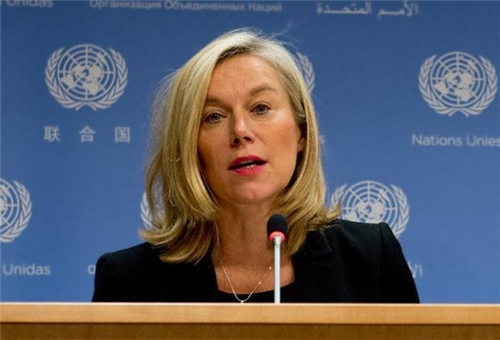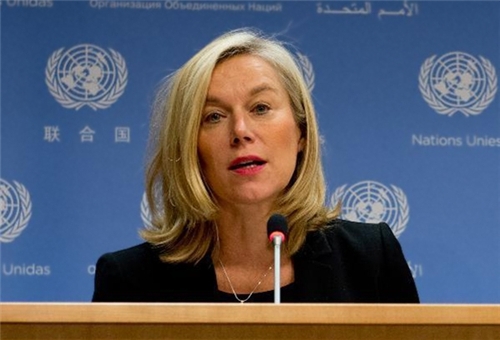 TEHRAN (FNA)- The Special Coordinator of the Organization for the Prohibition of Chemical Weapons (OPCW), Sigrid Kaag, arrived in Tehran on Wednesday to hold talks with senior Iranian officials on a number of issues, Syria in particular.
TEHRAN (FNA)- The Special Coordinator of the Organization for the Prohibition of Chemical Weapons (OPCW), Sigrid Kaag, arrived in Tehran on Wednesday to hold talks with senior Iranian officials on a number of issues, Syria in particular.Kaag is slated to discuss the Syrian crisis with Iranian Foreign Minister Mohammad Javad Zarif and other senior officials.
Kaag's visit to Iran takes place at the invitation of Iranian Deputy Foreign Minister for Arab and African Affairs Hossein Amir Abdollahian.
The OPCW announced on Tuesday that the final stockpile of Syria�s chemical weapons has been shipped out of the country.UN Secretary-General Ban Ki-moon hailed the cooperation of the Syrian government in shipping the chemical materials outside the country in the framework of Syria�s joining the Chemical Weapons Convention (CWC).
Ban said in a statement that he "welcomes the removal of the remaining 7.2 per cent of chemical weapons material from Syria".
The Secretary-General also congratulated the OPCW-UN Joint Mission for completing this most challenging of tasks in an active war zone, expressing gratefulness to the Governments of China, Denmark, Norway, the Russian Federation, the United Kingdom, the United States, Cyprus, Lebanon and Italy for providing support to the operations.
"The Secretary-General has welcomed the cooperation of the Government of the Syrian Arab Republic in assisting the Joint Mission to carry out its tasks".
The Secretary-General noted that "when there is political will � as demonstrated by the successful implementation of the mandated tasks of the Joint Mission � there can be progress towards peace."
The Russian Foreign Ministry also welcomed the successful completion of the international operation to remove chemical materials from Syria as a step prior to destroying them.
"This marks the end of the most important and complex stage of the plan to destroy chemical weapons outside the country, which was worked out by the Executive Council of the Organization for the Prohibition of Chemical Weapons (OPCW) and approved by UN Security Council Resolution 2118," the Ministry said.
On the other hand, Russia�s Ambassador to the UN Vitaly Churkin warned of the possibility that the armed terrorist groups would reach to the chemical weapons still exists.
Churkin pointed out that his country is still worried that some armed groups would possess chemical weapons that they may use in their attacks.
Iran has always stressed the urgent need for the dismantlement of the Weapons of Mass Destruction (WMDs), including chemical weapons, as it has been a victim of such weapons.
Tens of thousands of Iranians were killed and wounded by chemical weapons during the 1980-1988 Iraqi imposed war on Iran. Around 100,000 Iranians are still living with the effects, which include long-term respiratory problems, eye and skin problems as well as immune system disorders, psychological disorders, genetic disorders, and probably cancers.
Sardasht is a city in Northwestern Iran. According to the 2006 census, its population was 37,000. It lies in the West Azarbaijan province. It was the first city in which civilians were attacked with chemical weapons by former Iraqi dictator, Saddam Hussein during the imposed Iraqi war on Iran.
The population of Sardasht is Kurdish. Sardasht is also known for the many villages around it and their reliability on the city's market.
On June 28, 1987, Iraqi aircraft dropped what Iranian authorities believed to be mustard gas bombs on Sardasht, in two separate bombing runs on four residential areas.
Sardasht was the first town in the world to be gassed. Out of a population of 20,000, 25% are still suffering severe illnesses from the attacks.
In December 2013, Iranian Deputy Foreign Minister for Legal and International Affairs Seyed Abbas Araqchi and Director-General of the OPCW Ahmet Uzumcu signed a petition in condemnation of the use of chemical weapons.
Araqchi and Uzumcu signed the petition on the sidelines of an exhibition of the Chemically Disabled Iranians in the Dutch city of The Hague.
Iran as a member of the executive council of the OPCW and also as a victim of those weapons has always had powerful presence in the CSP sessions.
By Fars News Agency
The Iran Project is not responsible for the content of quoted articles.











